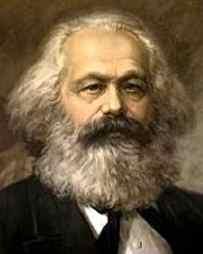 This is one of those books I’ve always felt I should read, but have held off. Reading Marx always seemed such a daunting task. Happily, I picked up an abridged version from the Brunswick library, recently released by Oxford World Classics. The blurb on the back says it contains most of volume one of Capital, which was published in Marx’s lifetime, and a few excerpts from volumes two and three, which were published posthumously.
This is one of those books I’ve always felt I should read, but have held off. Reading Marx always seemed such a daunting task. Happily, I picked up an abridged version from the Brunswick library, recently released by Oxford World Classics. The blurb on the back says it contains most of volume one of Capital, which was published in Marx’s lifetime, and a few excerpts from volumes two and three, which were published posthumously.Marx is one of those authors you are always reading about and hearing about. I don’t have to go into here how influential he’s been. So it’s always good to read the actual text of someone so influential and get the real, undiluted picture.
I can’t say that I was surprised by what I read in Capital, although I didn’t expect Capital to be so directly relevant to today. Volume one of Capital was published in 1867. A lot of it details the horrors of the British industrial revolution: child labour, the horrors of the factories, ridiculously long hours. One hundred and thirty-eight years later, in 2005, we have the same problems, with all our industrial work now moved off shore to where the labour is cheaper and the conditions much worse (detailed in Naomi Klein’s No Logo and covered in numerous documentaries). Anyone who follows such things knows how Nike made its billions by making its sneakers in Indonesia and paying its workers a pittance.
Capital is a mix of philosophy, journalism and history. It pulls apart in extraordinary detail how money and capital came about, how it functions and (with regards to capital) its rapacious nature. First we had commodities, which when exchanged brought about the need for money (realised in a standard value like gold). Once money was established, this led to the desire for increase of money, which in turn led to capital. Capital in turn led to industry and capitalism, the need for an endless stream of profits. That’s my brief take on Marx’s history of commodities, money and capital.
I should also say that the book is part polemic. This is, in a lot of places, a very bitter, bitchy, sniggering critique of capitalism, and perhaps may have created that style of vociferous journalism, that not only marshals facts to support an argument, but throws in a few bon mots for good measure. Capital concentrates on the dark side of capitalism, its endless greed, like a beast that needs constant feeding, and its victims, the human fodder required to keep the capitalist machine working at full steam. Marx shows that the natural end of capitalism is to keep workers on a bare living wage whilst making huge, obscene profits for itself. All this is in full flower today. It’s shocking how nothing has changed.
Another interesting point is that Marx does state that capitalism reduces the prices of commodities, and that it does produce a wealth of luxury. So obviously there are enormous advantages. We only need look around us (here in the West) at all that capitalism has brought us. Yet as I was reading, I couldn’t help but think of all the bones of previous generations that were crushed in back breaking labour to create the luxurious world I live in today.
Capital lifts the veil on luxury and wealth, and the picture isn’t pretty. Marx’s style might not be for everyone. His almost gleeful and triumphant rummaging through the horrors of capital you might find distasteful. Nevertheless, Capital remains a vitally important book. When you pull on a pair of jeans, think of the person who has laboured to create them. What conditions did they work under? Did they get paid properly? How much profit was made at their expense?
Horse racing tips for professional lay bettinghorse raceing
ReplyDelete